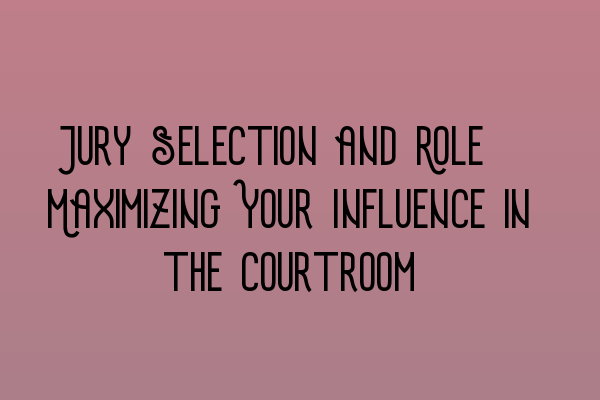Jury Selection and Role: Maximizing Your Influence in the Courtroom
In a criminal trial, the jury plays a crucial role in determining the outcome of the case. Therefore, as a solicitor, understanding the jury selection process and maximizing your influence in the courtroom is of utmost importance. In this article, we will explore the strategies and techniques that can help you select the right jury members and effectively present your case.
The Importance of Jury Selection
Jury selection is the process of choosing individuals from a pool of potential jurors who will make up the jury for a trial. It is an opportunity for both the prosecution and the defense to create a favorable jury composition. By selecting jurors who are more likely to empathize with your client’s position or have a certain bias, you can increase your chances of a favorable verdict.
To enhance your jury selection strategy, it is crucial to have a deep understanding of the case and its specifics. This will enable you to identify potential biases or preconceived notions that may influence a juror’s decision-making process.
Maximizing Your Influence in the Courtroom
Once the jury selection process is complete and the trial begins, it is essential to maximize your influence in the courtroom. Here are some tips to help you achieve this:
- 1. Develop a Strong Opening Statement: Begin your case with a well-crafted opening statement that outlines your key arguments and sets the stage for the jury’s understanding of the case. This is your opportunity to make a strong first impression and establish credibility.
- 2. Use Persuasive Language: Throughout the trial, make use of persuasive language that resonates with the jury. Clearly articulate your points, highlight evidence, and appeal to their emotions and logic. This will help you present a compelling case.
- 3. Engage with the Jury: Interacting with the jury during the trial is crucial. Maintain eye contact, use appropriate body language, and actively listen to their reactions. This engagement will help establish rapport and build trust.
- 4. Present Compelling Evidence: Presenting strong and compelling evidence is vital to support your arguments. Make sure to effectively present your evidence through expert witnesses, exhibits, and other means that are admissible in court.
- 5. Challenge Opposing Witnesses: Skillfully cross-examine the prosecution’s witnesses to expose inconsistencies, biases, or lack of credibility. This will weaken the opposing side’s case and strengthen your own arguments.
Implementing these strategies can significantly increase your influence in the courtroom and ultimately sway the jury in your favor.
Related Articles
- SQE 1 Practice Exam Questions
- SQE 1 Practice Mocks FLK1 FLK2
- SQE 2 Preparation Courses
- SQE 1 Preparation Courses
- SRA SQE Exam Dates
For further resources related to criminal law and practice in the UK, SQE Criminal Law & Practice Law UK provides comprehensive preparation courses for the SQE exams. These exams are essential for aspiring solicitors, preparing you for a successful career in criminal law. Don’t forget to check out the above-mentioned articles for more information and resources that can enhance your legal knowledge and skillset.
Remember, effective jury selection and maximizing your influence in the courtroom are key factors in achieving positive outcomes for your clients. Utilize the strategies outlined in this article, continue to refine your skills, and stay committed to providing exceptional legal representation.
